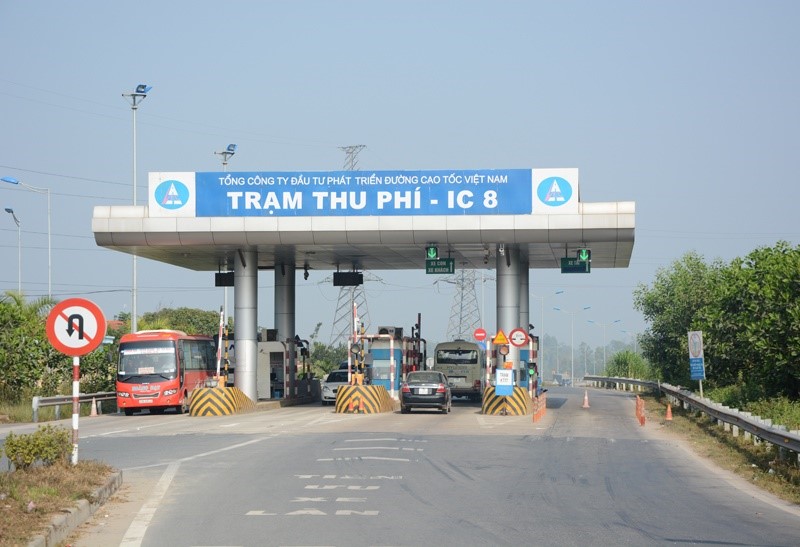Operational principles of toll booths in Vietnam
What are the operational principles of toll booths in Vietnam? - Nhu Tuong (Can Tho)

Operational principles of toll booths in Vietnam (Internet image)
Regarding this issue, LawNet would like to answer as follows:
1. Operational principles of toll booths in Vietnam
Operational principles of toll booths according to Article 4 of Circular 45/2021/TT-BGTVT are as follows:
* Criteria for the establishment of a toll booth:
- Must be situated within the range of the project (this does not applies with the collection method prescribed in Point a Clause 1 Article 9 of Circular 45/2021/TT-BGTVT).
- Must be approved by competent authorities in the study report on the feasibility of the investment project or the project on the utilization of assets and infrastructure of road traffic.
- Perform ETC methods and use modern and advanced technology to collect road tolls; in case of applying other methods, must be licensed by competent authorities.
- Ensure the effective investment of the public-private project in case the toll booth provide capital recovery for the project.
- Publicize the location of the toll booth on central and local mass means of communications and at the People’s Committee of the commune or district where the toll booth is placed from the date of approval by competent authorities as per regulation prescribed in Point a of this Clause 1 of Article 4 of Circular 45/2021/TT-BGTVT.
* Operational principles of toll booths:
Operations of toll booths must be publicized and transparent; ensure the safety and confidentiality of personal information of users; only provide information when approved by users or at the request of competent state agencies as per the law.
2. Responsibilities of the collection service provider and collection management unit in Vietnam
Responsibilities of the collection service provider and collection management unit according to Article 15 of Circular 45/2021/TT-BGTVT are as follows:
- The collection service provider shall:
= Issue ETC receipts with the correct subject and value for each subject that has to pay for road toll at toll booths; shall not collect or obstruct cases that are not subject to road tolls as per the law at the toll booth; shall not change the collection rate of road tolls without any written approval of state agencies.
= Conduct annual revenue audits in accordance with the law and the collection service contract;
= Regularly inspect and supervise the toll collection operations to ensure compliance with the contract or regulations of the law;
= Return the revenue of road toll collection to the collection management unit after deducting the cost of services of toll booths according to the collection service contract;
= Manage the whole amount transferred by vehicle owners to the toll payment account of the collection service provider as per the law;
= Issue value-added receipts for paid service prices of toll booths in the month and transfer such receipts to the related collection management unit;
- The collection management unit shall:
= Report the use of toll payment accounts of the service provider to competent authorities including measures to manage and use toll payment accounts of the collection service provider and commitment/agreement with the bank on the management and use of toll payment accounts of the collection service provider;
= Declare and pay tax as per the law;
= Make reports on revenue from road toll collection and the performance of road toll collection by month, quarter, 6 months, each year and report them to competent authorities as per regulation;
= Inspect, reconcile, and receive revenues from road toll collection service transferred by the collection service provider. Use this amount as a budget to recover capital for the PPP contract.
- Key word:
- toll booths
- in Vietnam
- Cases of land rent exemption and reduction under the latest regulations in Vietnam
- Economic infrastructure and social infrastructure system in Thu Duc City, Ho Chi Minh City
- Regulations on ordination with foreign elements in religious organizations in Vietnam
- Increase land compensation prices in Vietnam from January 1, 2026
- Determination of land compensation levels for damage during land requisition process in Vietnam
- Who is permitted to purchase social housing according to latest regulations in Vietnam?
-

- Emergency response and search and rescue organizations ...
- 10:29, 11/09/2024
-

- Handling of the acceptance results of ministerial ...
- 09:30, 11/09/2024
-

- Guidance on unexploded ordnance investigation ...
- 18:30, 09/09/2024
-

- Sources of the National database on construction ...
- 16:37, 09/09/2024
-

- General regulations on the implementation of administrative ...
- 11:30, 09/09/2024
-

- Notable new policies of Vietnam effective as of ...
- 16:26, 11/04/2025
-
.Medium.png)
- Notable documents of Vietnam in the previous week ...
- 16:21, 11/04/2025
-
.Medium.png)
- Notable documents of Vietnam in the previous week ...
- 16:11, 02/04/2025
-
.Medium.png)
- Notable new policies of Vietnam to be effective ...
- 16:04, 02/04/2025
-
.Medium.png)
- Notable new policies of Vietnam effective from ...
- 14:51, 21/03/2025

 Article table of contents
Article table of contents
